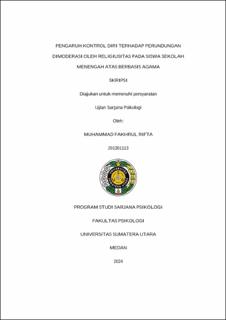Pengaruh Kontrol Diri terhadap Perundungan Dimoderasi oleh Religiusitas pada Siswa Sekolah Menengah Atas Berbasis Agama
The Influence of Self-Control on Bullying Moderated by Religiosity in Religious-Based High School Students

Date
2024Author
Rifta, Muhammad Fakhrul
Advisor(s)
Siregar, Suri Mutia
Metadata
Show full item recordAbstract
Bullying is a massive problem in Indonesia, data released by KPAI and FDSI recorded massive cases of bullying. One of the bullying cases that occurred at MAN 1 Medan. This study aims to determine the effect of self-control on bullying and the effect of self-control on bullying moderated by religiosity in religious-based high school students. In this study, the number of subjects used was 323 students with a sampling method, namely the cluster random sampling technique. The method in this study is a causal quantitative method. Data collection was carried out using a Likert scale with measuring instruments adapted from the Brief Self-Control Scale (BSCS), OBVQ-R (Olweus Bully/Victim Questionnaire-Revised), and Centrality of Religiosity Scale (CRS). The data obtained were processed using moderated regression analysis techniques. The study shows that self-control has a negative effect on bullying in religious-based high school students with a significance value of 0.001. The results of moderated regression analysis (mra) analysis show a significance value of 0.251, these results indicate that religiosity variable fails to moderate the effect of self-control on bullying. This study confirms the importance of self-control in reducing bullying behavior in religious-based high schools, but the role of religiosity as a moderator does not prove significant. The implications of these results can be used to maintain self-control to prevent bullying in the school environment.
Collections
- Undergraduate Theses [1427]
